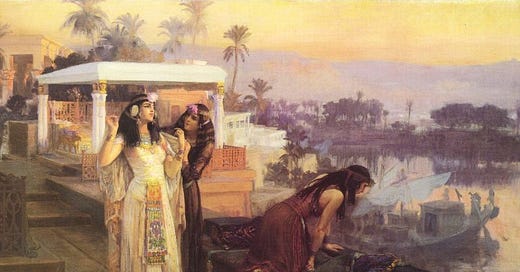Ancient Princesses: Diplomatic Agents & Religious Leaders
The Semitic princess Kirum was mistreated by a shitty king. But her story is unusual... and that tells us a lot about the role of princesses in the ancient world.
In the time of Hammurabi, there lived a Princess named Kirum, daughter of Zumri-Lim (king of a Semitic city-state in modern-day Syria). She eventually grew up and married her brother-in-law, Hays-Samu, because her sister had betrayed their father by failing to act properly as his “agent” in the foreign court. Zumri-Lim was forced to supplement one failed Ancient Princess with another, more loyal, alternative.
Unfortunately, it turned out that Hays-Samu was basically a violent treacherous ass (much like Kirum’s sister!) and Kirum was so miserable that she threatened to kill herself if her father didn’t come get her. Hays-Samu eventually divorced her — a huge humiliation, but at least then she could go home.
Yet, the takeaway here isn’t that ancient princesses in Mesopotamia were treated poorly — in many ways Kirum’s situation was unusual, as evidenced by her outrage and her expectation that something would be done to solve this problem. Most Mesopotamian kings weren’t violent murderous asses and most of the time…
Mesopotamian Princesses acted as their father’s ambassadors in their husband’s court.
Their role was not as simply a living symbol of alliance (although this was certainly a part of their role, similar to the daughters of Roman leaders) or even as an incubator for a man to put his grandson on a rival’s throne. It was the job of ancient princesses in the Levant to offer advice to their fathers on how best to deal with their husbands and presumably vice versa, to the betterment of all. The letters they wrote back home were filled with important diplomatic content.
Not all Mesopotamian Princesses were married off as part of this “diplomatic corps.” Similar to how the daughters of English nobles sometimes became nuns in convents (especially if they became inconvenient for someone (but see The Traitor Son Cycle by Miles Cameron for an awesome example of how the role of Abbess could be a powerful one), the daughter of a king might have been dedicated to a god as a priestess, obligated to pray to the gods for the health and prosperity of her father and his kingdom. As in the case of those Abbesses, this was a position of high power, prestige, and independence. Ancient Priesthoods often served as repositories of learning and scholastic expertise.
By contrast…
Ancient Princesses in Egypt had a very different role to those in Mesopotamia
Compared to the countries surrounding it, Ancient Egypt was an outlier in many ways. The economic shift of 1000 BCE passed it by for centuries, its Pharaohs keeping antiquated views about commerce and refusing to allow a trading class to emerge:
Egypt had a conservative kind of political economy compared to their neighbors. The geography of the Nile let the kings channel trade through central entrepoints under royal control, so there wasn’t an indigenous merchant class in Egypt to engage in long-distance trade until at least 700 years after their neighbors. — Civilizations of Africa by Christopher Ehret.
Kings holding onto power made Egypt a backwater. Nobody ever seems to talk about this? But it’s interesting.
Anyway, this isn’t to say that women in Egypt didn’t have a path to power. Hatshepsut and Cleopatra aren’t huge outliers; there were other Ancient Princesses that came to power in the region, they’re just not as well-known. It’s just that the Egyptian Pharaohs evidently wouldn’t dream of letting one of their Princesses marry a foreigner (although they were very happy to marry foreign princesses themselves). The Princesses had to be in charge for it to happen.
Amenhotep II made this abundantly clear when the Mittanian ambassadors were first working out an alliance with Amenhotep II, stating outright that “from time immemorial no daughter of the King of Egypt is given to anyone.”
This begs the question…
What did Ancient Princesses from Egypt do?
If Egyptian Princesses weren’t able to engage in the sort of diplomacy that their Mesopotamian counterparts handled, helping their fathers and brothers navigate the complexities of alliance and communication across vast distances by serving as trusted, live-in ambassadors, what did they do?
Some certainly married their brothers, bore them children, and doubtless lounged around. Some few ruled outright or co-ruled with their husbands or sons. But what about the rest of the Princesses, who did not enjoy such rarefied influence?
It seems that during the Old and Middle Kingdoms, Egyptian Princesses were married off — to local officials, much like how some Syrian princesses were married off to vassal kings. This changed in the New Kingdom but may have shifted back, given that Solomon allegedly married a daughter of the king of Egypt (1 Kings 3:1) about 400 years after Amenhotep II. During the time period being discussed by Brotherhood of Kings, though, it seems they spent most of their time doing “priestess duties,” entertainment, and harem work making stuff.
Note: If you’ve ever been tempted to think that “belonging to a harem” isn’t work, I highly recommend Michelle Sagara West’s Sun Sword series, which is one of my all-time favorite fantasy portrayals of a desert society, far surpassing Dune in its complexity and diversity.
Seriously — go read it, then come back here and tell me what you think.
Further Reading
Podany, Amanda H. Brotherhood of Kings: How International Relations Shaped the Ancient Near East. Oxford ; New York: Oxford University Press, 2010.
Ehret, Christopher. The Civilizations of Africa: A History to 1800. Charlottesville: University Press of Virginia, 2002.


